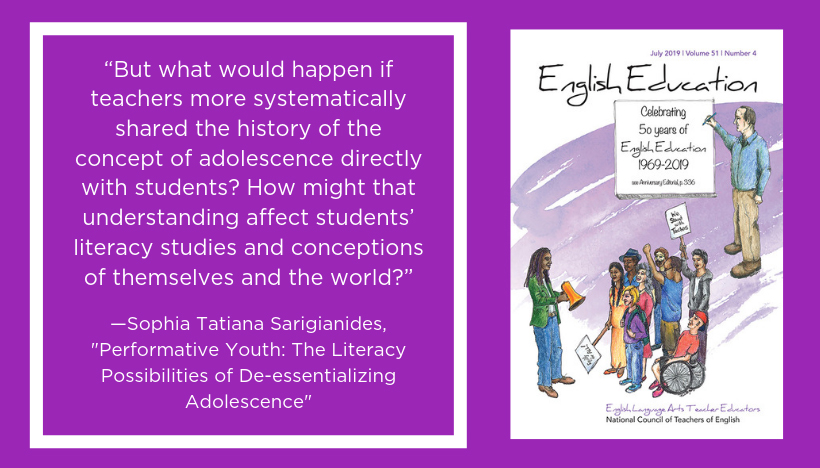This post is an excerpt from Sophia Tatiana Sarigianides’s article “Performative Youth: The Literacy Possibilities of De-essentializing Adolescence” in the July 2019 issue of English Education.
What might happen if teachers instruct youth directly about historically situated views of adolescence? This 10-week qualitative study examines what happened when a Black Jamaican English teacher instructed Black and Latino seniors in AP English about adolescence as a construct and guided them to apply this sociocultural lens of youth to texts in English class and to their lives. Using scholarship based in critical youth studies and Butler’s theory of performativity, this study shows the effects of giving students access to alternative discourses about adolescence. This study contributes to scholarship focused on centralizing youths’ interests in literature curriculum, for the purposes of increased literacy engagement.
Extant research has explored how ideas tied to adolescence generate implications for youth, teachers, and curriculum.
For example, if teachers believe that “raging hormones” govern adolescents’ behavior, they seek strategies for controlling youth in their teacher preparation programs rather than appreciate a focus on theory or other content (Finders, 1999).
Additionally, teachers maintain a distance between themselves and students whom they see as “other” to them (Petrone & Lewis, 2012). Further, stock views of adolescence inspire new teachers to select young adult literature (YAL) with protagonists, plots, and themes that match youths’ troubled “reality” (Lewis & Petrone, 2010).
When new teachers are offered suggestions through preservice coursework to vary representations of adolescence—perhaps with YAL portrayals of youth as sexual—these suggestions are seen as too risky (Sarigianides, 2012). When experienced teachers have been given the same suggestions to use YAL that includes sexual youth, teachers worried that the texts would work as impediments to youths’ future happiness (Sarigianides, 2014).
As one response to these problematic views of youth, some scholars, including myself, advocate for a re-imagining of adolescence in English teaching (Sarigianides, Lewis, & Petrone, 2015; Sarigianides, Petrone, & Lewis, 2017).
Such scholarship begins to show teachers ways that revised perspectives on adolescence might affect students, though still mostly through changing teachers’ views of youth. Some literacy studies begin to draw upon understandings from critical youth studies to teach youth directly.
In “‘Gotta Be Worse’: Literacy, Schooling and Adolescent Youth Offenders,” Finders (2005) focuses on an alternative-to-incarceration program for middle school students. These young people understood that their criminal records—and, for some, parenting status—thrust them out of the category of a legitimate adolescent who follows a “proper” trajectory to adulthood. For these students, achievement came from the recognition of peers who acknowledge them as having “worse” status than what society is convinced these youth already are. “Positioned as competent members of a community of youthful offenders on the one hand, but deemed failures in their schooling on the other, the performative choice was clear: their identity as resistant students had to be preserved” (pp. 112–113).
Once students learned alternate discourses about their own social positioning and through which to achieve literacy competence, some employed this understanding to write an opinion article for the city paper talking back to normative discourses of adolescence.
In this study, Finders pulled from her own understandings of constructs of adolescence to guide students to see how they are socially positioned as failures within this social category. Many of her students responded forcefully to this literacy curriculum, showing how knowledge around constructed views of adolescence compelled some youth in the group to engage with academic literacy.
But what would happen if teachers more systematically shared the history of the concept of adolescence directly with students? How might that understanding affect students’ literacy studies and conceptions of themselves and the world?
Additional research remains to be done to show the effects of sharing knowledge of adolescence as a construct directly with youth in literacy contexts, especially with minoritized youth conceptually left out of this social category and, often, literacy achievement.
This study addresses this gap by showing how one English teacher’s curriculum centralized the history of adolescence to engage students in rigorous literary analysis, writing, public speaking, and applications of these ideas to their lives.
Read the full article: “Performative Youth: The Literacy Possibilities of De-essentializing Adolescence” in the July 2019 issue of English Education.
 Sophia Tatiana Sarigianides is professor of English education at Westfield State University. Her research interests include using literature toward antiracist goals in English teaching and studying representations of adolescence in young adult literature and in teacher thinking. She is the author of Rethinking the “Adolescent” in Adolescent Literacy (with Robert Petrone and Mark Lewis) and has a forthcoming book on antiracist literature instruction (with Carlin Borsheim-Black).
Sophia Tatiana Sarigianides is professor of English education at Westfield State University. Her research interests include using literature toward antiracist goals in English teaching and studying representations of adolescence in young adult literature and in teacher thinking. She is the author of Rethinking the “Adolescent” in Adolescent Literacy (with Robert Petrone and Mark Lewis) and has a forthcoming book on antiracist literature instruction (with Carlin Borsheim-Black).

